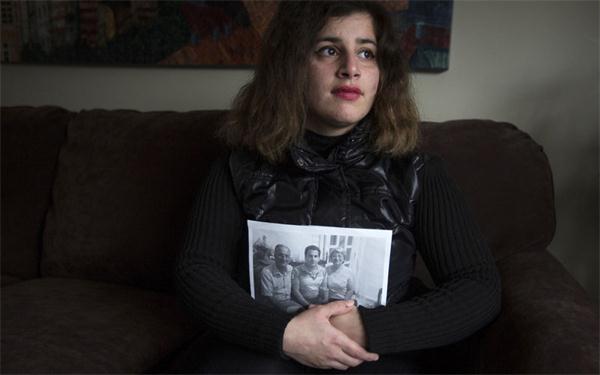Americans should welcome more syrian refugees
Updated: 2015-12-04 14:10
By Zhong Bu(chinadaily.com.cn)
|
||||||||
 |
|
Recent refugee from Syria Sandy Khabbazeh poses for a portrait while holding a photo of her family who remain behind in Syria, in Oakland, New Jersey, November 22, 2015.[Photo/CFP] |
Almost immediately after the Paris terrorist attacks on November 13, more than two dozens of governors in the United States announced that their states would not welcome Syrian refugees. Later when the news came out that a Syrian refugee’s passport was found near the body of a Paris suicide bomber, a few more governors, citing security concerns, joined to oppose the entry of Syrian refugees into their states.
These governors’ stance goes directly against their president’s, who calls on Americans to welcome more Syrian refugees as latter-day Pilgrims. In his Thanksgiving speech to Americans, President Obama again urges them to show generosity to Syrian refugees, reminding them that the Pilgrims who came to North America in 1620 were also fleeing persecution.
Back in September, Secretary of State John Kerry proposed to Congress members that the United States increases the total number of refugees allowed in the country to 75,000 in 2016 from 70,000 this year. In 2017, U.S. government plans to accept 100,000 refugees from all parts of the world. Meanwhile, at least 10,000 Syrian refugees should be accepted into the country in the next fiscal year, starting on October 1. In those days, no opposition to the plan was heard from any of the governors. Actually, the United States began to accept Syrian refugees since 2012, and 1,854 Syrian refugees had settled down and started their new lives, facing little opposition until now.
In fact, this is truly a shock to me when I see so many governors openly refuse refugees from a specific country. I never saw anything similar happened like this after I have lived here for almost two decades. As a nation of immigrants, America has long followed a national policy of accepting immigrants and refugees. It beckons to its shores the downtrodden, the persecuted, and all those “yearning to breathe free.” America embraces those who come with good work ethics in search of a land of promises and opportunities. Today more than 13% of the U.S. population are immigrants, the highest level since the 1920s. With this background in mind, I am disappointed at those governors who shut the door to Syrian refugees.
On the other hand, I do understand the governors’ concerns about terrorists sneaking into their states by hiding among the flood of Syrian refugees. But those governors are making promises they are unable to keep because states are not empowered to reject immigrants granted refugee status by U.S. federal government. Legally, U.S. state governments do not have the legal foundation for engaging in foreign or diplomatic relations. The federal government assumes the authority in handling issues of immigration, naturalization and deportation.
According to the U.S. Refugee Act of 1980, U.S. presidents have the power to admit refugees who face persecution or a well-founded fear of persecution based on race, religion, nationality, membership in a particular social group or political opinion, which is exactly what President Obama plans to do. A 2012 decision, Arizona v. United States, reaffirmed the federal government's authority over the states on immigration matters and specifically stated that it might be "inappropriate" to return an immigrant to a country mired in civil war. It is clear that state governments do not have legal authority to refuse the Syrian refugees that are admitted by the federal government.
Still, I feel that those governors’ attitude to Syrian refugees reflects part of Americans’ public opinion regarding U.S. refugee policy. In addition to the security concerns of Syrian refugees, some Americans have plenty of reasons worrying about refugees. My home state Pennsylvania, for example, is very open to refugees and has accepted many from Ukraine, China, Mexico and other Latin America countries. The arrival of new refugees does bring in a series of social issues and financial burden to local governments and communities. In the past few years, a small number of refugees living in Pennsylvania were charged with theft, burglary, drug dealing, and even murder. But to be fair, I did not see any data suggesting that the refigures’ crime rate be higher than non-refugees. But there are data showing most refugees catch up with other Americans in a short period of time.
One of the historic examples are about Vietnamese refugees. After the Vietnam War ended, the United States accepted more than 120,000 in 1975 alone. A Gallup poll at the time found that only 36% of Americans agreed to bring them to their country. Most Americans then feared the Vietnamese refugees would either “steal” jobs from them or end up to be a burden on the welfare system if they failed to land jobs. Some worried that the Cold War was still raging, and the refugees might sway the future political leanings of the country. Others concerned that Americans, desperate to leave the war behind, simply dreaded seeing Vietnamese faces on their streets.
Four years later in 1979, Time magazine reported that though the transition hadn’t necessarily been a smooth one, most of the Vietnamese immigrants who had come to the U.S. in 1975 had adjusted well. Employment was actually higher among that group than the average of the American population, and the number who depended on the government for help was sinking. According to Time magazine, about three-quarters of those 1975 Vietnamese families earned $800 a month or more, which is $2,775 in today’s dollars. The Vietnamese immigrant population remains relatively well-off in the United States even since.
Comparing to the refugees from other areas in the world, 120,000 Vietnamese refugees was not a large number for America. After World War II, about 400,000 Eastern Europeans came to the United States, while 650,000 Cubans were accepted into the country as refugees after Cuba cut its diplomatic ties with the United States in 1961.
Facing the civil wars and endless rampage of Islamic State terrorists, Syrian people are desperately needing more humanity aid from the International communities, in which the United States should play a bigger role, including accepting more refugees from that area.
The author, Dr. Zhong Bu, Associate Professor from College of Communications, Pennsylvania State University.
- Locals have tradition of drying foods during harvest season
- Beijing-Tianjin-Hebei govts to cooperate on emissions control
- Web promotion of prostitution to be targeted
- Two more spells of smog predicted to sweep North China
- Glass bridge in grand canyon of Zhangjiajie under construction
- Road rage cases pose huge safety challenge

 Can Chinese ‘white lightning’ make it in US?
Can Chinese ‘white lightning’ make it in US?
 Gunmen go on a killing spree in Southern California
Gunmen go on a killing spree in Southern California
 Chinese, South African presidents hold talks to cement partnership
Chinese, South African presidents hold talks to cement partnership
 China, Zimbabwe agree to boost cooperation
China, Zimbabwe agree to boost cooperation
 First lady visits Africa's 'new window' on China
First lady visits Africa's 'new window' on China
 BRICS media leaders to secure louder global voice
BRICS media leaders to secure louder global voice
 Western science in the eyes of Chinese emperors
Western science in the eyes of Chinese emperors
 Top 10 smartphone vendors with highest shipments in Q3 2015
Top 10 smartphone vendors with highest shipments in Q3 2015
Most Viewed
Editor's Picks

|

|

|

|

|

|
Today's Top News
Shooting rampage at US social services agency leaves 14 dead
Chinese bargain hunters are changing the retail game
Chinese president arrives in Turkey for G20 summit
Islamic State claims responsibility for Paris attacks
Obama, Netanyahu at White House seek to mend US-Israel ties
China, not Canada, is top US trade partner
Tu first Chinese to win Nobel Prize in Medicine
Huntsman says Sino-US relationship needs common goals
US Weekly

|

|








